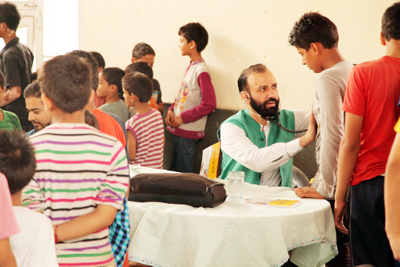Excelsior Correspondent
JAMMU, May 22: Head of the Department of Cardiology in Government Medical College and Super Speciality Hospital (GMC&SSH) Dr. Sushil Sharma today spent the day with children in Bal Niketan in Amphalla.
A team of doctors accompanied by Dr. Sushil Sharma screened children to find out if anyone was suffering with Rheumatic or congenital heart disease. More than 150 inmates were examined, evaluated and given free medicines. The camp was held with the sole ambition of finding out children who need the help the most.
Regarding the cardiovascular diseases among children, Dr. Sushil said that the highest incidence of Congenital Heart Disease is seen below 5 years while Rheumatic Disease cases are often noticed in children in the age group of 6-12 years of age. Tachycardia, dyspnoea, feeding problem, failure to thrive, repeated infections, cyanosis and clubbing are common clinical manifestations in congenital heart disease,” said Dr. Sushil Sharma while interacting with children.
He added that palpitation; migrating arthritis, dyspnoea, repeated infections and mitral regurgitation are commonly observed in Rheumatic heart disease. He further said that having rheumatic fever leaves a child more susceptible to heart damage but it does not always permanently damage the heart. However, when the inflammation caused by rheumatic fever leaves one or more of the heart valves scarred, the result is rheumatic heart disease.
Dr. Sushil further said that mitral valve and the aortic valve are commonly involved by the disease. Years later, the mitral valve may become narrowed or regurtitates . Treatment of acute rheumatic fever includes antibiotics to treat the streptococcal infection and additional medications to ease the inflammation of the heart and other symptoms, said Dr. Sushil.
He maintained that usually aspirin is given in large doses until the joint inflammation goes away; rarely, steroids are needed. “Once the acute illness has gone away, patients need to take penicillin, or an equivalent antibiotic, for many years to prevent recurrences. This is a very important treatment because the risk of heart valve damage increases if rheumatic fever reoccurs,” added Dr. Sushil Sharma. Most often valve leak caused by the disease is mild and does not need treatment.
Trending Now
E-Paper


